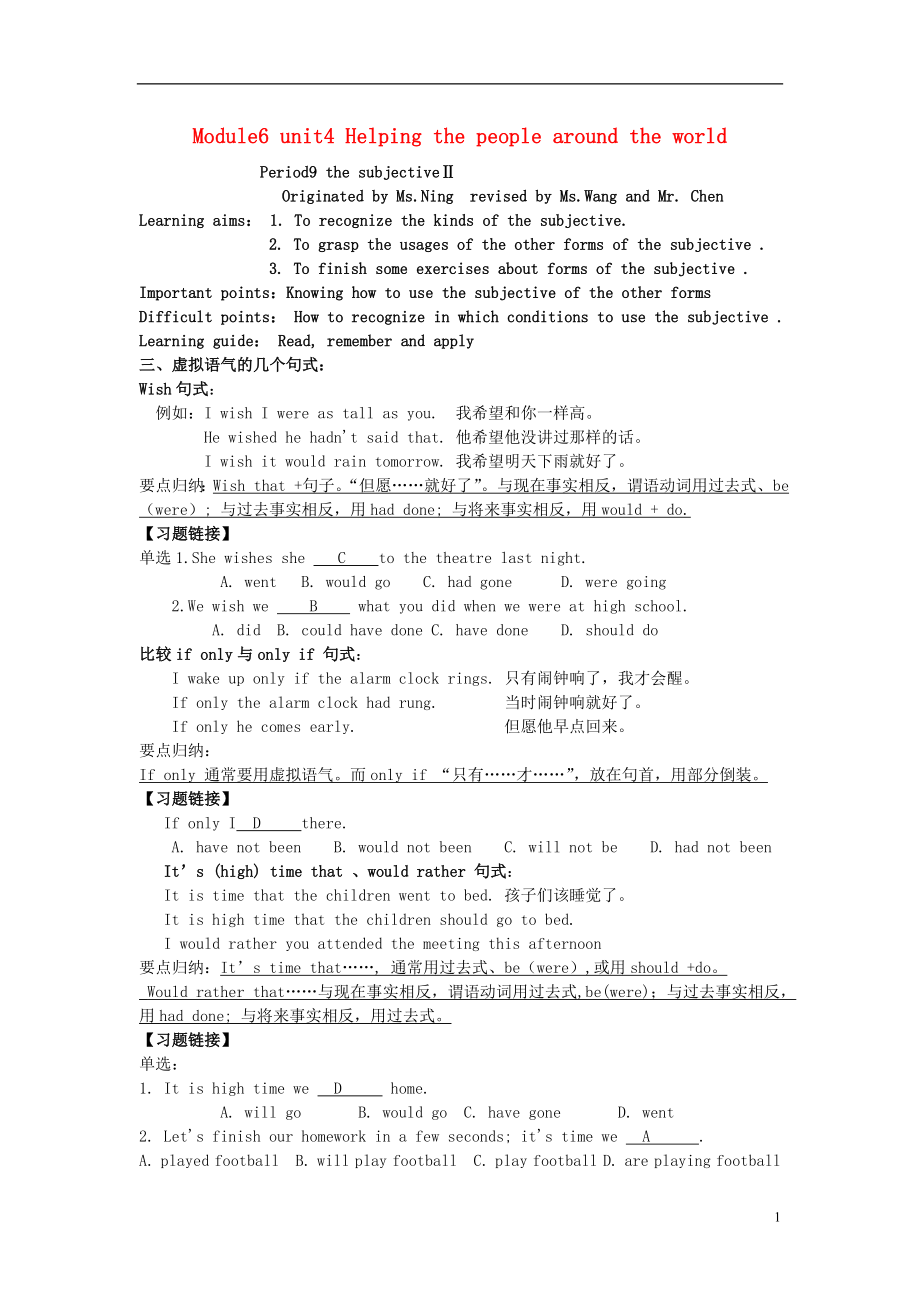《2015年高中英語(yǔ) 第四單元《Helping the people around the world》導(dǎo)學(xué)案9 牛津譯林版選修6》由會(huì)員分享����,可在線閱讀,更多相關(guān)《2015年高中英語(yǔ) 第四單元《Helping the people around the world》導(dǎo)學(xué)案9 牛津譯林版選修6(2頁(yè)珍藏版)》請(qǐng)?jiān)谘b配圖網(wǎng)上搜索���。
1�����、
Module6 unit4 Helping the people around the world
Period9 the subjectiveⅡ
Originated by Ms.Ning revised by Ms.Wang and Mr. Chen
Learning aims: 1. To recognize the kinds of the subjective.
2. To grasp the usages of the other forms of the subjective .
3. To fi
2���、nish some exercises about forms of the subjective .
Important points:Knowing how to use the subjective of the other forms
Difficult points: How to recognize in which conditions to use the subjective .
Learning guide: Read, remember and apply
三、虛擬語(yǔ)氣的幾個(gè)句式:
Wish句式:
例如:I wish I were as tall as
3�、you. 我希望和你一樣高。
He wished he hadn't said that. 他希望他沒(méi)講過(guò)那樣的話����。
I wish it would rain tomorrow. 我希望明天下雨就好了。
要點(diǎn)歸納:Wish that +句子�����?!暗浮秃昧恕薄Ec現(xiàn)在事實(shí)相反,謂語(yǔ)動(dòng)詞用過(guò)去式�����、be(were); 與過(guò)去事實(shí)相反����,用had done; 與將來(lái)事實(shí)相反,用would + do.
【習(xí)題鏈接】
單選1.She wishes she C to the theatre last night.
A. went B. would
4�����、 go C. had gone D. were going
2.We wish we B what you did when we were at high school.
A. did B. could have done C. have done D. should do
比較if only與only if 句式:
I wake up only if the alarm clock rings. 只有鬧鐘響了����,我才會(huì)醒。
If only the alarm clock had rung. 當(dāng)時(shí)鬧鐘響就好了���。
5����、If only he comes early. 但愿他早點(diǎn)回來(lái)�����。
要點(diǎn)歸納:
If only 通常要用虛擬語(yǔ)氣。而only if “只有……才……”�,放在句首����,用部分倒裝。
【習(xí)題鏈接】
If only I D there.
A. have not been B. would not been C. will not be D. had not been
It’s (high) time that ��、would rather 句式:
It is time that the children went to
6�����、bed. 孩子們?cè)撍X(jué)了�����。
It is high time that the children should go to bed.
I would rather you attended the meeting this afternoon
要點(diǎn)歸納:It’s time that……, 通常用過(guò)去式����、be(were),或用should +do。
_Would rather that……與現(xiàn)在事實(shí)相反�,謂語(yǔ)動(dòng)詞用過(guò)去式,be(were);與過(guò)去事實(shí)相反���,用had done; 與將來(lái)事實(shí)相反���,用過(guò)去式��。
【習(xí)題鏈接】
單選:
1. It is high time we
7����、D home.
A. will go B. would go C. have gone D. went
2. Let's finish our homework in a few seconds; it's time we A .
A. played football B. will play football C. play football D. are playing football
3. Don’t you think it is time you B
8�����、 smoking?
A. give up B. gave up C. would give up D. should give up
4. I am too busy these days. I would rather all of you C next month for a dinner.
A. come B. would come C. came D. have come
含蓄句式:
But for your help, we couldn’t have succeeded.
They wouldn’t have reache
9����、d the agreement so easily without that common ground.
She wasn’t feeling very well. Otherwise she wouldn’t have left the meeting so early
要點(diǎn)歸納:
But for/otherwise/or/without等引導(dǎo)短語(yǔ)相當(dāng)于if 引導(dǎo)的條件狀語(yǔ)從句,句子使用相應(yīng)的動(dòng)詞形式����。
1. Without heat and sunlight, plants on the earth A well.
A. would not grow B
10、. will not grow C. had not grown D. would not be grown
2. But for my classmates' help, I D the work in time.
A. did not finish B. could not finish C. will not finish D. would not have finished
3. But for the rain, we B a nice holiday.
A. should have B. w
11�����、ould have had C. would have D. will have had
Test
1.“It is high time that we C generation gap between young and old.” said British Queen Elizabeth Ⅱwhen delivering her Christmas message yesterday.
A.have bridged B.bridge C.bridged D.will bridge
2. I am sorry that he D
12�、 in such poor health.
A. are B. shall be C. were D. should be
3. That is a good book. You C it yesterday.
A. could buy B. should buy C. should have bought D. bought
4. If only I D to the lecture!
A. listen B. will listen C. am listening D. had
13、listened
5. Without electricity, human life D quite different today.
A. is B. will be C. would have been D. would be
6. He A you more help, even though he was very busy.
A. might have given B. might give C. may have given D. may give
7. Mike's father, as well as his mo
14�����、ther, insisted that he D home.
A. stayed B. could stay C. has stayed D. stay
8. Mr. Smith insisted that he D the work all.
A. had done B. have done C. did D. do
9. It is important that we A .
A. shall close the window before we leave
B. will close the window before we leave
C. must close the window before we leave
D. close the window before we leave
2
 2015年高中英語(yǔ) 第四單元《Helping the people around the world》導(dǎo)學(xué)案9 牛津譯林版選修6
2015年高中英語(yǔ) 第四單元《Helping the people around the world》導(dǎo)學(xué)案9 牛津譯林版選修6

